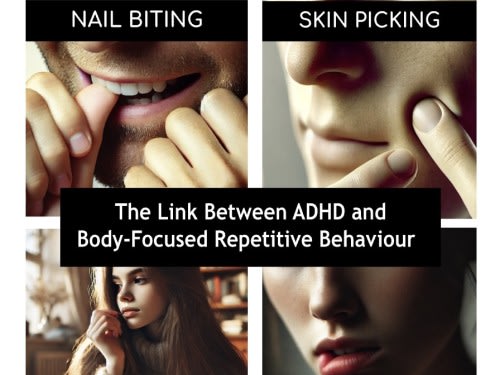ADHD and Repetitive Behaviours

posted 17th January 2025

ADHD and Repetitive Behaviours: The Link
Emerging evidence highlights a significant link between Attention Deficit Hyperactivity Disorder (ADHD) and body-focused repetitive behaviours (BFRBs). Individuals with ADHD often experience heightened sensitivity to boredom due to their brain's constant need for stimulation. This can lead to restlessness and difficulty engaging in tasks that lack immediate interest or reward. To alleviate this discomfort, they may engage in repetitive behaviours that provide temporary relief or stimulation.
Studies indicate that impulsivity and emotional dysregulation, hallmark traits of ADHD, can exacerbate these behaviours. For example, research has shown that individuals with ADHD are more prone to engaging in activities like nail biting or skin picking as a means to self-soothe or maintain focus (source: GetInFlow). Additionally, the need for constant stimulation may drive these actions, making them difficult to control without intervention.
Understanding this link is crucial for developing effective treatment strategies. Addressing the underlying ADHD symptoms can significantly reduce the occurrence of repetitive behaviours by improving impulse control and emotional regulation.
The Origins of Repetitive Behaviours
Repetitive behaviours are often rooted in early life experiences and shaped by a combination of genetic, neurological, and environmental factors. Studies suggest that these behaviours may serve as maladaptive coping mechanisms to manage overwhelming emotions or sensations. Over time, they can become deeply ingrained, creating a cycle that is difficult to break without intervention.
Why Seek Psychological Support?
Many individuals feel shame about their repetitive behaviours, preventing them from seeking help. However, addressing these issues through therapy can significantly improve mental well-being and daily functioning. Psychologists can offer tailored approaches to help individuals regain control, reduce distress, and build healthier coping mechanisms.
Evidence-Based Interventions
Cognitive Behavioural Therapy (CBT): This is one of the most effective treatments for repetitive behaviours. Techniques such as Habit Reversal Training (HRT) help patients identify triggers, develop alternative responses, and reduce the frequency of their behaviours.
Mindfulness-Based Interventions: Mindfulness practices can increase self-awareness and reduce the compulsive urge to engage in repetitive actions.
Pharmacological Treatments: In some cases, medications such as selective serotonin reuptake inhibitors (SSRIs) or ADHD medications can help manage underlying symptoms of anxiety, impulsivity, or emotional dysregulation.
Suggestions for Managing ADHD-Linked Repetitive Behaviours
Identify Triggers: Work with a therapist to recognise patterns and situations that exacerbate the behaviour.
Develop Alternative Strategies: Replace the repetitive behaviour with healthier activities, such as squeezing a stress ball or practising deep breathing.
Structure and Routine: ADHD often thrives in predictable environments. A structured schedule can help reduce the likelihood of boredom and impulsive actions.
Therapeutic Support: Engage in therapies like CBT or ACT to address both ADHD symptoms and repetitive behaviours simultaneously.
Medication: Consult a healthcare provider about the potential benefits of ADHD medications in reducing impulsivity and emotional distress.
Repetitive behaviours such as hair pulling, nail biting, and skin picking are not merely habits—they are complex conditions that require compassionate and informed care. The link between ADHD and these behaviours underscores the importance of addressing co-occurring conditions. Psychological clinics equipped with evidence-based therapies can provide invaluable support, helping individuals reclaim control over their lives and achieve emotional well-being. If you or someone you know struggles with these behaviours, reaching out to a psychologist is a crucial step toward recovery.
For further information or to schedule a consultation, contact our clinic today. Let us help you or your loved ones find relief and healing.



